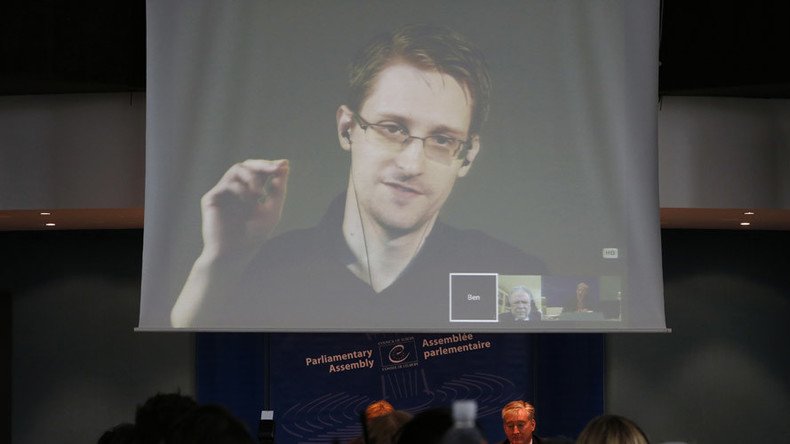‘He is one of us:’ Snowden’s lawyer on how whistleblower hid among refugees in Hong Kong

The refugees who provided Snowden with shelter in Hong Kong recognized that the whistleblower was in distress and embraced the opportunity to assist him, as they had experienced similar circumstances in the past, human rights lawyer Robert Tibbo told RT.
Whistleblower Edward Snowden found shelter in the homes of several refugees in Hong Kong in 2013 while he was on the run from US authorities after revealing the NSA’s spy programs. Some of the asylum seekers used to be the clients of Snowden’s lawyer, Robert Tibbo.
RT: It’s been three years since Edward Snowden was granted asylum in Russia, and little is known about how he evaded authorities or even that he was sheltered by some of your clients. Can you tell us more, please?
Robert Tibbo: One thing I want to clarify is that my clients that provided refuge to Mr. Snowden in Hong Kong are not Chinese. There are two families that are from Sri Lanka, Sinhalese, and one family that is from the Philippines. Mr. Snowden was given a visa that allows him to live and work in Russia at this time. It is not an asylum visa per se, it is actually a residency visa.
'Most wanted man in the world is in my house!' - How #HongKong refugees sheltered #Snowdenhttps://t.co/W3PXwQVlq1pic.twitter.com/tuktCZ1jM8
— RT (@RT_com) 9 сентября 2016 г.
RT: During this time, Edward had to move numerous times. Did you manage to keep in contact with him?
RTb: From the time that I received instructions and was briefed to provide legal advice, legal assistance to Mr. Snowden, the decision was made to place him in a location where basically he would be able to go underground; he wouldn’t be identified or interfered with by the media, or the government in Hong Kong, or any other government. While he was under those circumstances, there were various means to communicate with Mr. Snowden. The primary means were through encrypted online communications. So, with that system in place, it was not a problem to communicate with Mr. Snowden during the entire time.
RT: We know that the apartments where he was staying while in Hong Kong were all in a poor, run-down area of the city. Was there any risk that the refugees might betray him?
RTb: Based on my experience with the refugees in Hong Kong, and in particular my clients, that was not an issue. The refugees who have come to Hong Kong, who have sought asylum have legitimate claims; they are ordinary people, decent people. When they met Mr. Snowden they recognized that he was in distress, that he was seeking refuge, and they saw him as one of them, because they themselves in the past when they fled their own countries had experienced similar circumstances. So there was a quick calculation in my clients’ minds that “Mr. Snowden’s one of us,” and they stepped forward and embraced the opportunity to assist Mr. Snowden the way others had assisted them in the past.
Snowden to appear in Oliver Stone film ‘Snowden’ https://t.co/MUnGlyVbQBpic.twitter.com/IwnZGHAF4K
— RT (@RT_com) 9 сентября 2016 г.
RT: Why do you think the people who sheltered Edward decided to reveal these facts now? Could this help their own cases?
RTb: The primary reason is that the existence of the refugees, and their participation and providing a safe haven for Mr. Snowden when he was in Hong Kong, will be disclosed in Oliver Stone’s new film, Snowden. Based on the reality that I have a limited number of clients, and my clients who did not provide refuge to Mr. Snowden will be asking who these people are, it is an inevitability that the refugees’ identities will eventually be disclosed at some point after the film.
RT: Could these people face reprisals because of that?
RTb: Their identities will eventually come out after the film, so a decision was taken to introduce them to the public before the film comes out, so that the public can be informed, and they can be presented as who they really are. The second reason, which is consequential to that, is that these asylum seekers as many other asylum seekers, live under what, from a legal perspective, is inhumane and degrading conditions. This treatment is simply unacceptable. With these eight refugees, with their participation in assisting Mr. Snowden, they are going to come under a lot more pressure. Quite simply I would like to see these eight refugees resettled in another country at the soonest time.
RT: What do you think the future holds for Edward?
RTb: There has been a lot of positive change that has been brought about by Mr. Snowden’s revelations in 2013. Mr. Snowden has a legal team, and there are a number of efforts that are being made on his behalf. I think this is a long-term series of issues. We’re looking at this in a positive way for Mr. Snowden.
The statements, views and opinions expressed in this column are solely those of the author and do not necessarily represent those of RT.












